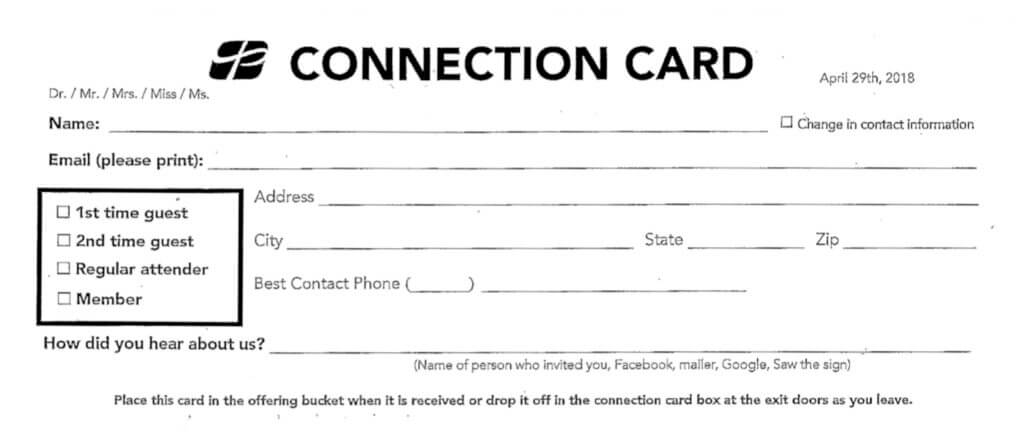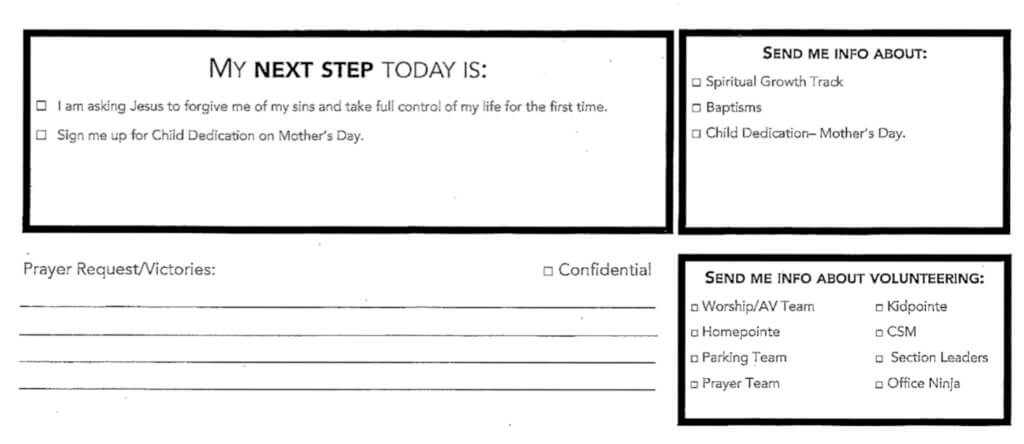Connection Cards Still Matter
|
|
My wife is currently undergoing her second round of chemotherapy. For the next few weeks she will be constantly exhausted and mentally drained. She will take longer to walk to the car, have less energy to eat, and feel nauseous at even the slightest smell.
Side effects are expected.
There are things that can lessen these side effects or bring some momentary peace. For the most part, she has a plan when they hit. But if you really want to know what makes this journey easier and the burden lighter, I’ll tell you: it’s people. It’s the calls, emails, texts and flowers. It’s her friends talking a moment out of their day to check in. Short calls are always the best, because the road to recovery can be so lonely.
What does this have to do with connection cards?
Nothing. And everything.
You never know where people are at when they are a guest at your church. You can track to some degree how they arrived at your church, who brought them, if your website and social media presence played a part and so on. But you will not know a person’s story unless they share it with you.
This is why my wife’s story has everything to do with connection cards.
When we attended service Saturday night at North Coast Church, she opened the bulletin and completed the connection card. I never think too much of these cards. At times it’s a way to gauge attendance, increase engagement, or let someone know you made a decision. But it was different Saturday. As she completed the card and placed it in the basket, I thought about how this may be someone’s only lifeline. We’ve been attending North Coast and have a lot of great friends there. Larry has been a mentor of mine for almost five years. Chris and Dennis are good friends who I trust dearly. Many more on staff get me on a deep level. But to the guest who completes a connection card for the first time at North Coast, these people are nothing to them but a faceless name ... until they aren't.
That’s why the connection card process is everything.
Connection cards are critically important. Whether paper or digital, they give people an opportunity to respond. Perhaps more importantly, they give people a way to engage. This may be someone’s first interaction with a church, maybe the first time they’ve ever reached out for help. Maybe they’ve made a first time decision for Jesus. Maybe they want to get baptized at next month’s baptism service. Maybe they want to attend the Welcome Dessert at Larry’s House next month. Anything. In essence, it’s their first next right step and it matters.
So when Sarah handed in that card, I got to thinking:
- Dang. That's a lot of writing.
- Holy smokes! She takes much better sermon notes than me.
- I wonder if anyone going to see this.
- Oh. Who is going to see this?
- How will they respond?
- Are they going to pray for her?
- Is someone going to call and offer support?
- When are they going to reach out?
- Do they care?
- How is this going to make my wife feel?
I know they care. I know someone sees the cards. But what happens next? Do they read a card and pass it along to the appropriate department in a timely manner, so a connection is made?
The number one reason guests don't return to your church is a lack of meaningful connection.
Your sermons and worship music will inform a decision, as will your affinity offerings (like kids ministries and small groups), but if a person feels alone in their journey with God at your church, they’re out.
You need to know a few things here. When someone hands in a completed connection card, they are handing you their trust. They are giving you their information; personal data that is safeguarded to a high degree in our digital world. They are sharing their decisions, giving you an inroad to influence and direct (pastor) their next steps. They are passing along their hopes and fears, asking you to join them in prayer.
The baseline of every healthy relationship is trust.
If someone is trusting you with their life and information, then you need to treat it with all due diligence? So let me ask you this: What is your known and accepted assimilation process? When a connection card comes in, who is that team member that will run point and help create a meaningful connection? Once a connection has been made, how are you clearly communicating their next right step, ensuring meaningful connections continues?
The last thing anyone wants is to feel isolated.
If a guest is handing you their trust, then you need a plan that manages this trust explicitly.
I’ve always been a fan of how Crosspointe Church Anaheim does this. They are a 1500 member church in the heart of Disney, where being entertained is a central component of peoples lives. Yet they grew by over 300% last year. Their growth has not been accidental or chance. They are entirely intentional and have a plan for guests at every point of entry. Also, their connection card strategy is dialed down to a science.
I want to share with you what they do once they receive a connection card and direct you to some amazing guest connection cards. After you've taken a look at the process for connecting at Crosspointe (below) take a look at MinistryVoice, as they have created five simplified connection card templates for you. You might be looking at these templates and thinking, "Whoa. There's barely any information there." And you know what? You may be right. But it all depends on context. If your context allows for more information sharing, then lean that way. If it's a more millennial church, then understand that they likely only want to give you their first name and email address. Neither are right or wrong; just different. Take as much insight as you can and implement it into a process that works for you.
Thanks for reading this far. Thanks for praying for my wife during this next round of chemo. And most importantly, thank you for caring for the guests that God brings your way.
Connection Card Follow-Up
Brian Moore is a great pastor. He's got his team dialed in and focused on the mission at hand. He also understand that every important decision requires a next right step. That's why I want to share with you how he has his team process connection cards.



Thanks for posting this great article on how to use connection cards effectively! Love the followup breakdown at the end. Thank you for linking to MinistryVoice’s connection card templates. I’m honored. God bless.
Ryan,
You’ve developed some quality resources. Thanks for helping our audience out. It’s more than appreciated. If there are more resources we can point people to in the future, you can rest assured that if it fits, it will be featured.
– Russ
Thanks so much, Russ! Keep up the great work.
Four sure. You do the same. And if you ever want to collaborate, let me know. There is a lot to get done together!